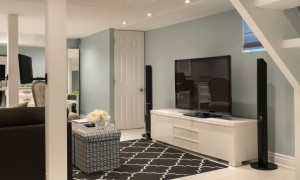Recent innovations in building materials and installation have led many homeowners to think about installing hardwood flooring in finished basements. However, before selecting flooring, consider the moisture level in your basement and how you intend to use the added living space.
Will the finished basement be a children’s play area, a teenagers’ “Wii Central,” or a home gym? If any of the above, a highly durable flooring material should be preferred. If you plan to use the space to entertain friends and family, you may want a more formal look.
In the Philadelphia area, hurricanes, heavy snows, and powerful nor’easters are becoming increasingly frequent, taking a toll on basements that may not have experienced water leaks before. To accurately gauge potential issues, spend some time observing moisture patterns in your basement. An odor of mold or mildew is one clue to hidden dampness. Check your sump pump activity. Does it switch on frequently? If it does, can you pinpoint the reason why? Do you find puddles on the floor every time an inch of rain falls? To answer these questions reliably, you may need to live in your home for months or years.
Hardwood Flooring
Although hardwood flooring is a timeless choice, humidity levels below ground, even in dry basements, are too inconsistent for this material. According to flooring manufacturer Armstrong, engineered hardwood may be an option in some basements due to its multi-ply structure. Constructed with perpendicular layers of wood, engineered wood is more resistant than traditional hardwood—which is typically one solid layer— to moisture damage and the warping caused by temperature shifts.
Laminate Flooring
In the past 10–15 years, laminate floors have gained popularity due to their ability to mimic the appearance of wood. A photographic image of wood grain is printed on compressed fiberboard and then covered with a clear finish. Well-made laminates closely resemble wood, are easy to clean, and resist scratches and scuff marks unlike real hardwood flooring. As for installation, laminate pieces generally snap and lock together and can be laid directly on top of a base floor of tile or concrete. In basements, an additional vapor layer made of a material such as plastic is recommended as a moisture barrier.
Carpet
Carpet lends a warm, comfortable feel to a basement. However, the downside of this choice is that whereas carpet can withstand small leaks, the layer of padding below it will absorb water like a sponge and will need in time to be replaced. Carpet tiles are more expensive than rolled carpet, but if water intrusion is limited to a small area of your basement, the replacement of only a few tiles costs less than recarpeting the entire floor. If you like the look of carpet but want to limit spending, consider searching for an adequately sized remnant to cover your base flooring.
Home Gym Flooring
If you go the home gym route, rubber flooring can be directly installed instead of laminate or carpet, and gym mats can be placed on top. Rubber flooring provides the necessary support for home workouts and adds a professional gym look to your décor.
Vinyl and Tile
If you have a history of water issues, sheet vinyl and ceramic tile are two classic basement flooring options and are among the least likely to be damaged by moisture. Vinyl is sometimes installed over a wood subfloor because the concrete layer is not perfectly flat, but water can seep through cracks in the vinyl and damage the wood below. Ceramic tile, on the other hand, is impenetrable.
[cf]skyword_tracking_tag[/cf]







[…] If you go the home gym route, rubber flooring can be directly installed instead of laminate or carpet, and gym mats can be placed on top. Rubber flooring provides the necessary support for home workouts …read more […]
[…] If you go the home gym route, rubber flooring can be directly installed instead of laminate or carpet, and gym mats can be placed on top. Rubber flooring provides the necessary support for home workouts …read more […]
Waho ………… cool very decorative flooring
http://www.industrialflooringproducts.com
I recall boats being made out of wood for quite some time….yet it’s always the “bad” choice for a basement.
There are wood look tiles that look reasonably good enough. However, if your a purist you can certainly put solid wood in a basement when it’s the right species and in the right conditions.
Nice one..
Thank you for every other magnificent post. Installing solid hardwood flooring in a basement that is below grade generally voids the warranty, so if you really want the look of hardwood there, choose engineered over solid planks. hardwood floors
I think it’s not popular use hardwood floors in the basement but i think will look great. Great article
Basements are very tricky rooms.
You could install hardwood flooring down there but you have to be careful of
many conditions. First, what’s your main purpose for the
room?
Is it going to be a game room? A gym? A study? Or perhaps a storage room?
You need to decide that first and foremost. Secondly, you need to consider
where you live. If your weather conditions are adverse and constantly changing,
it could damage the hardwood. Finally, you need to look around your entire home
and see if adding hardwood in the basement would complement or offset your
overall home decor.
Basements are very tricky rooms.
You could install hardwood flooring down there but you have to be careful of
many conditions.
First, what’s your main purpose for the room?
Is it going to be a game room? A gym? A study? Or perhaps a storage room?
You need to decide that first and foremost. Secondly, you need to consider
where you live. If your weather conditions are adverse and constantly changing,
it could damage the hardwood. Finally, you need to look around your entire home
and see if adding hardwood in the basement would complement or offset your
overall home decor.
you should look into a new product for flooring in basements, Ventgrid.com. this product comes as a 4′ x 8′ sheet is 1/2 tall and features a 1/4 standoff which allows moisture that penetrates the walls to bypass the finished floor or wall and be collected by the sump system. It also creates a a passive thermal break, an inexpensive, easy to use solution for basement flooring installations.
[…] just put a coat of stain and lacquer on top. Another alternative to resurfacing is to put hardwood laminate flooring on top of the existing wood planks, which is another do-it-yourself […]
[…] just put a coat of stain and lacquer on top. Another alternative to resurfacing is to put hardwood laminate flooring on top of the existing wood planks, which is another do-it-yourself […]
[…] just put a coat of stain and lacquer on top. Another alternative to resurfacing is to put hardwood laminate flooring on top of the existing wood planks, which is another do-it-yourself […]
[…] just put a coat of stain and lacquer on top. Another alternative to resurfacing is to put hardwood laminate flooring on top of the existing wood planks, which is another do-it-yourself […]
[…] just put a coat of stain and lacquer on top. Another alternative to resurfacing is to put hardwood laminate flooring on top of the existing wood planks, which is another do-it-yourself […]
[…] just put a coat of stain and lacquer on top. Another alternative to resurfacing is to put hardwoodlaminate flooring on top of the existing wood planks, which is another do-it-yourself […]
[…] just put a coat of stain and lacquer on top. Another alternative to resurfacing is to put hardwoodlaminate flooring on top of the existing wood planks, which is another do-it-yourself […]
[…] Can Hardwood Flooring Ever Be Used in a Basement? – Can Hardwood Flooring Ever Be Used in a Basement? The current popularity of hardwood flooring has led many homeowners to attempt to copy the same look in their basements. […]
Vinyl hardwood can withstand a water leak much better than a traditional hardwood flooring!